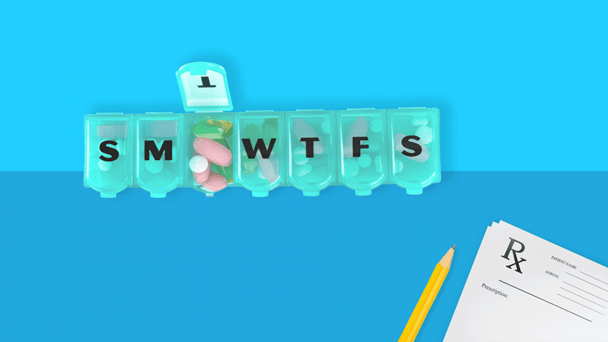
You take two red pills in the morning for this condition; one blue pill, twice a day for another, one white pill at night before bed and three brown capsules scattered throughout the day. However, you cannot take the blue and the brown at the same time, you have to wait over three hours after taking the red pill before you can take the blue one, and the white pill cannot be taken within two hours of the brown. Got that??
Managing medication can be quite difficult and confusing at times, especially when you are taking multiple medications for multiple conditions. It is imperative that patients have a full understanding of all their medications, as drug-on-drug interactions can be very harmful to your health. Therefore, we have provided seven tips on how to safely manage your prescriptions.
- Make a list
It is important to write down all the medication you are taking and the information that goes along with it. This includes, but is not limited to, the time of day, dosage required, size and color of pill, side effects, clashes, etc. It would also be helpful to add any dietary and herbal supplements you take, as these are known to interact with common drugs. Put the list in your phone or write it down on a piece of paper and leave this list by your bed, in your kitchen, or wherever you take your medication. You may even consider making an Excel spreadsheet with all this information listed.
Whenever you see your doctor or pharmacist, bring this list with you just in case. This is a great time to discuss its effectiveness and ask any questions you may have.
2.Use one single pharmacy
If you are getting your prescriptions from multiple places, the pharmacist may not have a complete picture of your drug profile. It is much easier for you and your physicians to keep track of your extensive medication list if you are getting them all from the same pharmacy. When the information is in one central location, it will minimize the chance of a doctor or pharmacist prescribing a medication that will clash with another drug or allergy. Safety first!
3. Research
You cannot assume that everything to know about the medication is on the warning label. Do your own research and make sure that you are taking the drug as safely as possible. Educate yourself on the side effects, what foods and/or liquids do not to mix with them, the duration of effect, and most importantly; how will they interact with other drugs. Adverse drug events can decrease or increase the strength of a certain medication, which could be very dangerous. This is why preparation is critical!
- Stay on schedule
Doctors know best, so follow their orders and guidelines. Try to take the pills at the same time every day and do not skip dosages without consulting a professional beforehand, even if you are ‘feeling better.’ Taking your prescriptions irregularly can cause symptoms to come back worse than they were before, making it harder to treat. Establishing a routine with your medication is extremely important.
and guidelines. Try to take the pills at the same time every day and do not skip dosages without consulting a professional beforehand, even if you are ‘feeling better.’ Taking your prescriptions irregularly can cause symptoms to come back worse than they were before, making it harder to treat. Establishing a routine with your medication is extremely important.
5. Keep up with refills
You never want to run out of your prescription. It may take a while to receive the next order—days, even weeks, possibly. Most patients cannot go that long without their medication. Call or visit your pharmacist immediately when your prescription is running low. Also, know when your pills expire. The expiration dates are not suggestions; drugs lose potency over time.
6.Management tools
There are many tools that can help you manage your medication and keep it organized. The traditionalist can use an automated pill dispenser or even the classic rectangular pill box with different compartments for the days of the week. For those who are a little more technologically advanced, there are several smartphone apps that can send reminders and track your adherence.
7. Ask questions!
We saved the most important for last. Never be afraid to ask a question when you are unsure about a certain step, side effect, or even why you need the medication in the first place. Doctors and pharmacists encourage you to ask questions. Caring for patients is what they studied all those years for. Take advantage of their knowledge!
